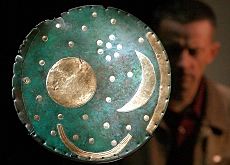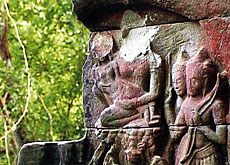Swiss act to limit traffic of illicit goods

Legislation comes into effect on June 1 that brings Switzerland into line with the 1970 Unesco Convention against cultural goods trafficking.
Switzerland earned a reputation as a transit point for stolen works of art because of its earlier reluctance to tighten laws on the transfer of cultural goods.
“Cultural goods are not normal goods – there’s a difference between having your TV stolen and having a cultural good stolen,” Andrea Raschèr, head of international and legal matters at the Federal Culture Office, told swissinfo.
“The subject of illicit trafficking of cultural goods in Switzerland became more sensitive a few years ago with the discussion of looted Jewish property during the Second World War.”
“This discussion reached a political level and as a result Switzerland now complies perfectly with international standards.”
Black sheep
Under the new legislation, art dealers and auction houses will be obliged to identify who they do business with, bringing an end to anonymous trading.
These institutions will have to keep accounts of their dealing activities as well as detailed information on goods exchanged.
“It is important that people who deal in cultural goods correctly can be separated from the black sheep,” said Raschèr.
Under the new law, the period after which cultural goods of unknown origin – often stolen – can legally come onto the Swiss market will increase from five to 30 years.
However, the law does not apply to works of art whose purchase price is less than SFr5,000 ($4,000).
A specialist unit at the Federal Culture Office will be responsible for monitoring the trade in cultural goods and ensuring it complies with the new legislation.
Cultural inheritance
This will also play an important role in preserving the world’s cultural heritage and in preventing theft, plundering and the illegal import and export of cultural goods.
Extra diligence will be applied to archaeological artefacts.
“Import/export is of course focused on archaeological and ethnological goods because they are the biggest problems – you can’t check what comes out of the earth,” said Raschèr.
“These are the main goods for the identity of a nation and this is what most countries – including Switzerland – protect very strongly.”
Trade hub
Switzerland ratified the 1970 United Nation’s Unesco Convention only in 2003. This regulates the transfer of cultural objects in 94 nations and encourages international cooperation.
The Federal Culture Office says Switzerland is among the art world’s five biggest trade hubs. The import and export of cultural goods is a SFr1.5 billion market in Switzerland.
“Internationally, stolen works of art make up the third-biggest illegal market behind drugs and the arms trade,” said Raschèr.
The problem has always been particularly acute in Switzerland due to the lack of legislation.
Gold star
However, Switzerland has notched up some successes regarding illegal trafficking of cultural goods.
In 2002 the bronze and gold “Sky Disk of Nebra” caused a global sensation when it appeared from nowhere on the international antiquities market.
The 12-inch disk, which dates back to 1,600BC, is the world’s oldest image of the cosmos.
Its seller claimed it had been looted in 1999 by illegal treasure hunters with a metal detector from Nebra in Saxony-Anhalt, in the former East Germany.
In fact it had been stolen amid the confusion of German reunification and had been on the black market for years with an asking price of up to $10 million.
Archaeological artefacts are the property of the state in Saxony-Anhalt and following a sting by Swiss police in Basel, the disk was returned to Germany.
swissinfo, Thomas Stephens
1962: Switzerland ratified The Hague convention for the protection of cultural property in the event of armed conflict.
October 2003: Swiss ratification of the 1970 Unesco convention against illegal trafficking of cultural property.
June 2005: New legislation comes into effect in Switzerland in line with Unesco convention. It was approved by parliament in 2003.
The new legislation obliges art dealers and auction houses to identify customers.
Foreign owners of stolen artwork will now have 30 years to claim it back.
Switzerland is among the art world’s five biggest trade hubs.
The import and export of cultural goods is a SFr1.5 billion market in Switzerland.

In compliance with the JTI standards
More: SWI swissinfo.ch certified by the Journalism Trust Initiative




You can find an overview of ongoing debates with our journalists here. Please join us!
If you want to start a conversation about a topic raised in this article or want to report factual errors, email us at english@swissinfo.ch.